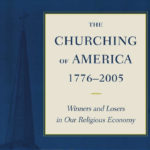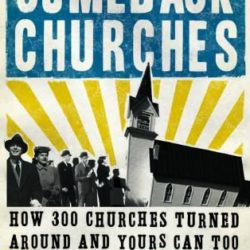By Joe Epley
If you were to ask me what these rural multisites have in common, I could list two distinct things I know about them. The first is that these towns and community centers can be found geographically in western South Dakota. The second is that each of them is the site of a rural church or community center, planted and parented by Bethel Church located in Rapid City, SD. These churches have popped up during the ministry tenure of Gerad Strong, who pastored Bethel Church from 2012-2020.
As I sat down with Pastor Gerad for a phone interview, it quickly became apparent that he had created healthy and growing churches in rural contexts. As much as this result caught my attention, I was captivated more so by the principles that produced this success. While not every church can succeed at producing feasible multisites, they all can generate healthy culture and impact their community. Once this became clear, we shifted our discussion to these principles, namely the celebration of change, the shift from a scarcity mindset to an outreach mindset, and the raising of leaders from within the local church.
1) The Celebration of Change.
Change can often seem like a curse word in churches. From Pastor Gerad’s point of view, change is a comprehensive retooling of what one believes about church and how one acts on that belief. During his tenure as pastor, he tackled challenge after challenge. He worked tirelessly to involve more lay people in ministry, to free up his time as a pastor to follow God’s vision, and to properly balance church boards and internal church concerns with community outreach. In some respects, many of these challenges are felt in rural churches across America, especially by the pastors who serve in them.
The question becomes simple: “What do you celebrate?” Pastor Gerad insisted that in order to change the DNA of the church, different things have to be celebrated. Instead of celebrating goals that only existing believers would cherish, he instead decided to celebrate the pivotal moments where unbelievers entered the church. Whether it was a community outreach or a new salvation or water baptism, Gerad became convinced that churches reproduce what they celebrate.
Sometimes growth is as simple as a fresh perspective. For a portion of his time at Bethel, Gerad also joined the sheriff’s department. This experience in the community led to a humbling moment of clarity. One of the heaviest thoughts that came to him was whether or not his community would notice if their church suddenly disappeared. If the answer was no, it meant the church was not doing enough to show true love to those around them. The second thing he realized was that Christians who have attended church for a long time (as well as the pastors that lead them), often spend time arguing about things that do not truly matter. While it may seem important to speak of the internal affairs of the church, it is, in Gerad’s opinion, much more important to look out toward the unbeliever and see what can be done to reach them.
2) The Shift from a Scarcity Mindset to an Outreach Mindset.
Gerad grew passionate as he discussed the need for a drastic shift in mindset within rural churches, pastors, and people. Many rural communities have, at one time or another, been affected by a deeply rooted sense of lack. Accompanying this is an impending sense that resources must be looked after or even hoarded because eventually they will not be there anymore. Gerad gave a solid rebuke to this mindset, instead calling for a reckless generosity on the part of churches, or at the very least a willingness to invest in outreach even if it does not yield immediate financial returns.
As pastors, this can be incredibly challenging to hear, and even harder to lead others into. However, once a shift in mentality takes place, a church begins to invest resources into the people of the community. From Gerad’s perspective, these churches experience God’s blessing and frequently see their community begin to open up to the Gospel.
3) The Raising Up of Leaders Within the Church.
Gerad spoke of developing leaders and it became apparent that he was both experienced in this area and an excited spectator who simply enjoyed watching people answer God’s call. Pastor Gerad truly listened to God’s heart for calling people, and in doing so found within himself a burden to disciple them well and prepare them for ministry. He began to ask himself and his church how they were fostering and cultivating the call of God in their local congregations. This culture eventually produced churches that are spreading the Gospel over an entire region of South Dakota. Even more surprisingly, or perhaps not surprisingly at all, this culture eventually gave rise to Gerad’s own replacement as lead pastor.
Keith Culver, who recently took over as lead pastor, represents the comprehensive journey of leadership development provided by Bethel Church. While sitting under the leadership of Bethel Church, Keith became aware of the call of God on his life. He then proceeded to share this call with Pastor Gerad, expressing desire for more training. During this time, he became the main campus pastor for the growing church and was in that role for seven years before expressing a desire to be a lead pastor. Gerad worked with him, giving him more and more opportunity and insight into leadership within the church, intending to send him out as a lead pastor. However, when Gerad received the call of God to minister elsewhere, it became clear to him, and eventually Keith, that God had been preparing him to take over as lead pastor at Bethel Church.
Keith’s story is inspiring because it holds lessons for us as rural pastors. We must be concerned enough about the call to ministry that we invite people to hear God’s call through our regular church meetings. We must weave the call of God into how we preach and teach. The challenge for us as ministers is to allow space for the Holy Spirit to call people directly into God’s service. Keith’s story teaches us the importance of leadership development. The call of God in a lay person must be matched with our intentionality to fan that call into flame and equip them to succeed. Finally, we must be willing to send people out if need be, knowing that God will take care of our own church even as we send people out.
Some rural pastors could not feasibly do multisite church, especially if the next closest “community” is nothing more than a herd of cows grazing over the next hill. However, every rural pastor can learn to embrace change, shift from a scarcity mindset, and develop leaders locally. It is precisely this fact—that this goal is entirely within the grasp of the rural church—that has caused Pastor Gerad Strong to so persistently practice these principles in his context. The combination of change, abundance mindset, and leadership development allowed a partnership that launched rural ministries in the western South Dakota communities of Edgemont, Sturgis, Summerset, Wall, and Cornerstone Rescue Mission. God is looking to instill in us the same persistence and intentionality, as we do our best to faithfully serve Him. As we practice these principles, God will continue bringing people to Himself through the rural church.
Questions for Reflection:
- What are some roadblocks in your church to meaningful change?
- What is a good first step you can practically take to overcome these roadblocks?
- What is one thing your church could better celebrate in order to reach the lost?
- How much does your church invest in outreach financially? Are there ways to increase or better utilize these available funds?
- What are you doing on a regular “Sunday Morning Service” to cultivate the call of God in believer’s lives?





















